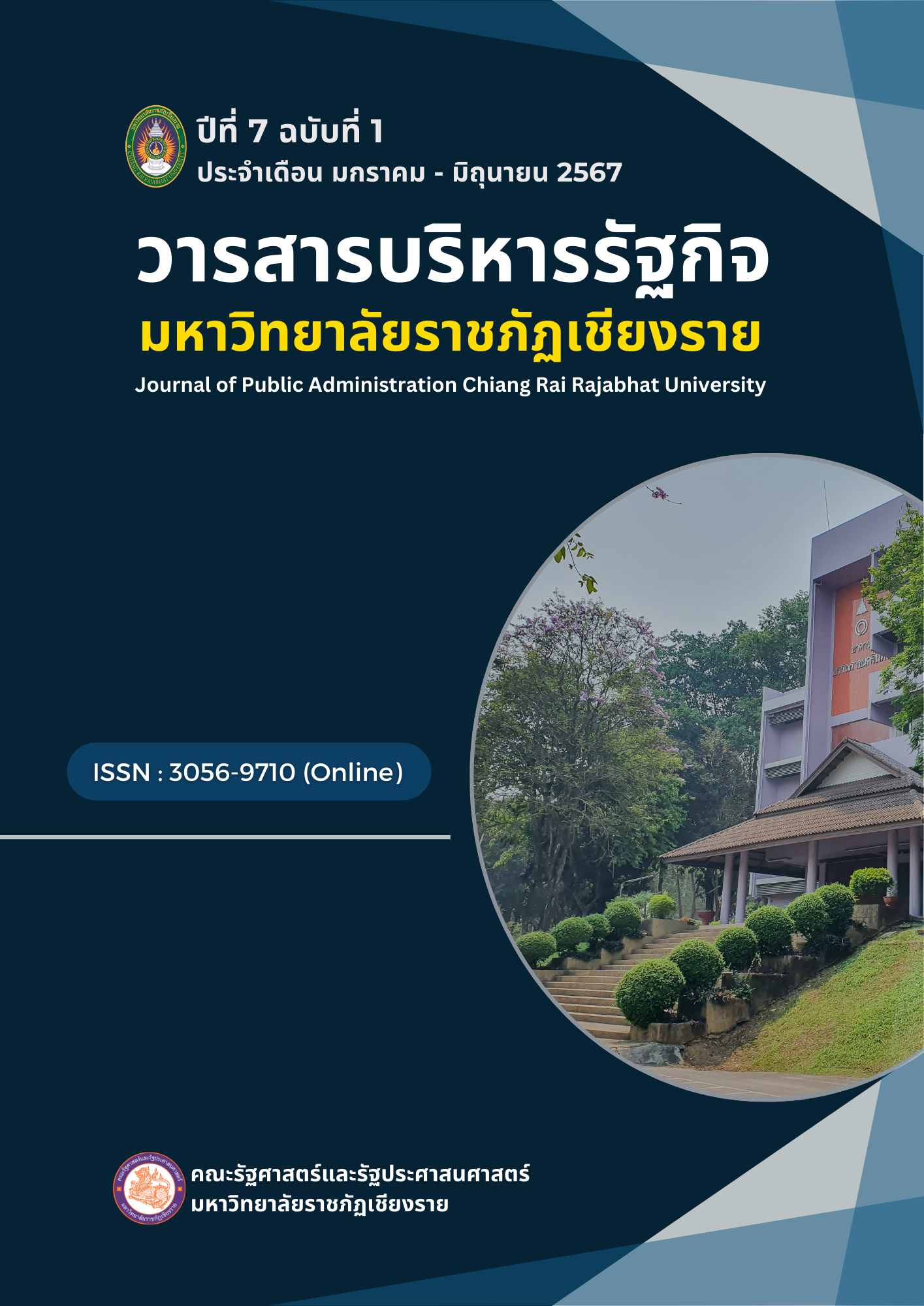การสร้างนวัตกรรมทางสังคมและการจัดการทรัพยากรมนุษย์เพื่อการรวมเข้ากับกลุ่มที่มีความเปราะบางในบริบทของคนชราและคนพิการ
Main Article Content
บทคัดย่อ
บทความวิชาการนี้มีจุดมุ่งหมายเพื่อศึกษาความท้าทายและความต้องการของผู้สูงอายุและผู้พิการในบริบทสังคมไทยปัจจุบัน โดยให้ความสำคัญกับการสร้างนวัตกรรมทางสังคมและการบริหารจัดการทรัพยากรมนุษย์ เพื่อตอบสนองต่อกลุ่มเป้าหมายเหล่านี้อย่างมีประสิทธิภาพและประสิทธิผล บทความนี้มุ่งสำรวจแนวทางและกลยุทธ์ในการสร้างโอกาสและช่องทางใหม่ ๆ ให้แก่ผู้สูงอายุและผู้พิการ เพื่อส่งเสริมการมีส่วนร่วมอย่างเต็มศักยภาพในสังคม ผลการศึกษาพบว่า การบริหารทรัพยากรมนุษย์ (Human Resource Management: HRM) มีบทบาทสำคัญในการสนับสนุนและขับเคลื่อนนวัตกรรมทางสังคมสำหรับผู้สูงอายุและผู้พิการ ผ่านองค์ประกอบหลักต่าง ๆ อันได้แก่ กระบวนการสรรหาและคัดเลือกบุคลากร การพัฒนานโยบายและแนวปฏิบัติ การสนับสนุนและพัฒนาความก้าวหน้าทางอาชีพ ตลอดจนการประเมินผลและการปรับปรุงอย่างต่อเนื่อง ทั้งนี้ การกำหนดยุทธศาสตร์ด้านการบริหารทรัพยากรมนุษย์ที่ชัดเจนและมีประสิทธิภาพในการส่งเสริมนวัตกรรมทางสังคม จะสามารถสร้างผลลัพธ์เชิงบวกต่อคุณภาพชีวิตและความเป็นอยู่ของผู้สูงอายุและผู้พิการได้อย่างเป็นรูปธรรม นอกจากนี้ บทความวิชาการยังเปิดมุมมองใหม่ในการสร้างสังคมที่ครอบคลุม เสมอภาค และยั่งยืน โดยการส่งเสริมการมีส่วนร่วมและการเข้าถึงทรัพยากรของผู้สูงอายุและผู้พิการ การผลักดันในแนวทางดังกล่าวนี้ ไม่เพียงแต่จะช่วยสร้างโอกาสและความเท่าเทียมเท่านั้น หากยังจะเสริมสร้างความเข้มแข็งและความยั่งยืนให้แก่สังคมในภาพรวมอีกด้วย ด้วยเหตุนี้ บทความนี้จึงไม่ได้เป็นเพียงการรวบรวมและวิเคราะห์ข้อมูลสภาพปัญหาเท่านั้น หากแต่ยังมุ่งสังเคราะห์ความรู้และนวัตกรรมทางสังคม เพื่อนำไปสู่การสร้างแนวปฏิบัติที่ดีสำหรับการพัฒนาและการสนับสนุนกลุ่มเปราะบางในสังคมต่อไปในอนาคต
Article Details
เอกสารอ้างอิง
Adla et al. (2020). Human resource management and innovation in SMEs. Personnel Review, 49(8), 1519-1535.
Ayoko, O. B. (2021). SMEs, innovation and human resource management. Journal of Management & Organization, 27(1), 1-5.
Bataglin, J. C., & Kruglianskas, I. (2022). Social innovation: Field analysis and gaps for future research. Sustainability, 14(3), 1153.
Bondarouk, T., & Olivas-Lujan, M. R. (Eds.). (2014). Human resource management, social innovation and technology. Emerald Group Publishing.
Campopiano, G., & Bassani, G. (2021). Social innovation: Learning from social cooperatives in the Italian context. Journal of Cleaner Production, 291(3) 125253.
Charoenluk N. (2023). Research and Development of Volunteer Networks for Enhancing the Health of Vulnerable Groups in Communities. Rajabhat MCR Peace Studies Review, 11(3), 848-861.
Charoenrat, S. (2021). Developing Technology, Facilities, and Audiobook Innovations to Reduce Inequality for the Disabled and Underprivileged in Society. Sri Lanchang Review, 7(2), 1-22.
Chiarajit, C. (2022). Social Innovation and Sustainable Community Livelihood Network Development. Rajabhat MCR Social Sciences Review, 11(2), 1-8.
Chiarajit, C. (2022). Towards an Aging Society: Social Innovations and Strengthening Networks for Elderly Development in Thai Society. Journal of Social Development and Administrative Strategies, 24(1). 49-67.
Chuasuwan, T., & Chansamdee, R. (2023). Challenges and Issues for People with Disabilities and Their Caregivers During the COVID-19 Pandemic. Journal of Social Welfare Studies, 31(1), 118-155.
Dias, J., & Partidário, M. (2019). Mind the gap: The potential transformative capacity of social innovation. Sustainability, 11(16), 4465.
Khruthamamash, A. (2023). A Study on the Employment Outcomes of Social Innovation Foundations According to Life Quality Development Standards for the Disabled. Journal of Roi Kaen Sarn Academi, 8(10), 707-718.
Kruaephat, K. (2021). The Initiation of Change by Leaders: Key Factors of Leadership Success in Developing Social Innovations for Model Communities. Thammasat University Journal of Arts, 21(2), 409-433.
Mahardhani, A. J. (2023). The Role of Public Policy in Fostering Technological Innovation and Sustainability. Journal of Contemporary Administration and Management (ADMAN), 1(2), 47-53.
Matwangsaeng, P. (2020). The Impact of Strategic Human Resource Management on Organizational Performance in Thai Higher Education Institutions. Journal of Research and Development Institute Rajabhat Maha Sarakham University, 7(1), 473-486.
Phantalae, P. (2023). Thai Social Inequality in the Era of New Normal Life. Mahamakut Buddhist University Journal of Social Sciences, 5(2), 185-200.
Phonsuphap, T., & Kraseasinsin, R. (2021). The Transition to Digital Labs and Changing Roles in Human Resource Management. Sakthong: Journal of Humanities and Social Sciences, 27(1), 1-19.
Pongsuwan, P. (2023). Three Core Principles for Human Resource Management in the Digital Age. Rajabhat Interdisciplinary Innovation Review, 6(2), A74-A88.
Promsut, T. (2022). Development Models of Human Resources in the Era of Thailand 4.0 for Provincial Industrial Offices. Journal of Innovation in Management and Administration, 10(3), 11-22.
Pungvivatnikul, W. (2019). Human Resource Management in the Context of Future Thai Workforce in the Digital Technology Era. Rajabhat MCR Buddhist Wisdom Review. 4(2), 285-298.
Rasool, S. F., Samma, M., Wang, M., Zhao, Y., & Zhang, Y. (2019). How human resource management practices translate into sustainable organizational performance: the mediating role of product, process and knowledge innovation. Psychology research and behavior management, 12, 1009-1025.
Saktrakul, S. (2023). Organizational Management for Security Based on Human Resources. Rajabhat Interdisciplinary Innovation Review, 6(3), 90-103.
Song, W., Yu, H., & Xu, H. (2021). Effects of green human resource management and managerial environmental concern on green innovation. European journal of innovation management, 24(3), 951-967.
Tupanich, W., & Wongsawat, P. (2023). A Prevention Model for the Risks of Depression among Older Adults with Non-Communicable Diseases. Doctoral dissertation. Phitsanulok: Naresuan University.
Watthanabutr, B. (2019). Potential of Human Resources by the Private Sector to Create Learning Innovations for Sustainable Development in the 21st Century. Rajabhat MCR Social Sciences Review, 8(4), 191-200.


